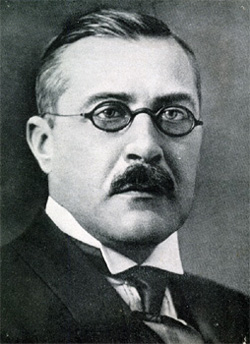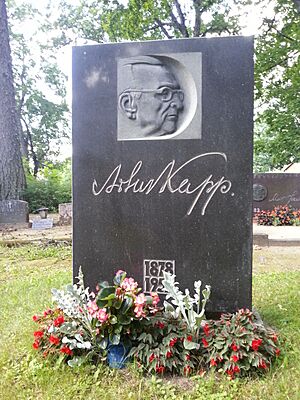Artur Kapp facts for kids
Artur Kapp (born February 28, 1878 – died January 14, 1952) was an important Estonian composer. He is often seen as one of the people who helped start symphonic music in Estonia.
Contents
Early Life and Musical Training
Artur Kapp was born in Suure-Jaani, Estonia. At that time, Estonia was part of the Russian Empire. His father, Joosep Kapp, was also a musician.
Artur began studying music at the Saint Petersburg Conservatory in 1891. He learned to play the organ from Louis Homilius. He also studied how to compose music with the famous composer Nikolai Rimsky-Korsakov. Kapp finished his studies at the Conservatory in 1900.
A Career in Music
From 1904 to 1920, Artur Kapp worked as a music director in Astrakhan, a city in southern Russia. After that, he returned to Estonia. He became a professor and conductor at the Tallinn Conservatory.
Many future famous Estonian composers were his students. These included Evald Aav, Edgar Arro, Gustav Ernesaks, Helen Tobias-Duesberg, Riho Päts, and Enn Võrk. Artur Kapp, along with Rudolf Tobias, is considered one of the founders of Estonian symphonic music.
A Family of Composers
Music was a big part of the Kapp family. Artur's son, Eugen Kapp (1908–1996), also became a well-known composer. So did his nephew, Villem Kapp (1913–1964). Both Eugen and Villem studied at the Tallinn Conservatory with Artur Kapp.
Artur Kapp's Music
Artur Kapp wrote many different kinds of classical music. His works are varied and cover many genres.
Some of his most famous pieces include:
- The overture Don Carlos (from 1899).
- The cantata Paradiis ja Peri (Paradise and Peri) from 1900. Both of these large works feature the organ.
- His oratorio Hiiob (Job).
- Metsateel (On A Road Through The Woods), a piece for a solo voice.
He also wrote five symphonies, five concertos, and four orchestral suites.
Later Years and Legacy
After some big changes in his country during World War II, Kapp retired from his position as a composer. He moved back to Suure-Jaani. He passed away there in 1952 at the age of 73. His music career lasted for more than 50 years.
His last major works included:
- The overture "To the Party" (1947).
- Symphony No. 4 (1948).
- Symphony No. 5, also called the Peace Symphony.
To celebrate Artur Kapp's musical work, the annual Suure-Jaani Music Days festival was started in 1998. This festival also honors the music of his son, nephew, and fellow composer Mart Saar. The festival takes place in different venues, including churches and the Kapp Museum.
External links/Sources
- The International Arthur Kapp Society
- Eesti Muusika Infokeskus/Estonian Music Information Center
- Eesti Muusika Festivald - Suure-Jaani Music Days
See also
 In Spanish: Artur Kapp para niños
In Spanish: Artur Kapp para niños



